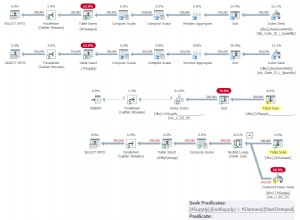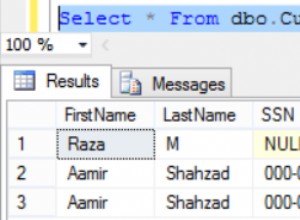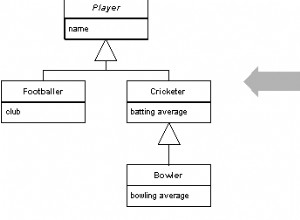Mesmo se você usou
GenerationType.AUTO sem nenhum parâmetro específico de SEQUENCE, você não poderá salvar identificadores atribuídos. Existem algumas soluções alternativas se você estiver disposto a fazer alguns compromissos:
-
Uma maneira seria mudar para os identificadores atribuídos. Você pode usar identificadores UUID, que funcionam tanto para MySQL quanto para Oracle, e também pode atribuir os valores manualmente.
-
Outra maneira é usar um gerador de tabela personalizado.
Primeiro você define uma interface Identificável:
public interface Identifiable<T extends Serializable> {
T getId();
}
Então você estende o gerador de tabela:
public class AssignedTableGenerator extends TableGenerator {
@Override
public Serializable generate(SessionImplementor session, Object obj) {
if(obj instanceof Identifiable) {
Identifiable identifiable = (Identifiable) obj;
Serializable id = identifiable.getId();
if(id != null) {
return id;
}
}
return super.generate(session, obj);
}
}
Este gerador é capaz de misturar identificadores atribuídos com os gerados sintéticos:
doInTransaction(session -> {
for (int i = 0; i < 5; i++) {
session.persist(new AssignTableSequenceIdentifier());
}
AssignTableSequenceIdentifier tableSequenceIdentifier = new AssignTableSequenceIdentifier();
tableSequenceIdentifier.id = -1L;
session.merge(tableSequenceIdentifier);
session.flush();
});
gerando as seguintes declarações:
select tbl.next_val from sequence_table tbl where tbl.sequence_name=default for update
insert into sequence_table (sequence_name, next_val) values (default,1)
update sequence_table set next_val=2 where next_val=1 and sequence_name=default
select tbl.next_val from sequence_table tbl where tbl.sequence_name=default for update
update sequence_table set next_val=3 where next_val=2 and sequence_name=default
select tbl.next_val from sequence_table tbl where tbl.sequence_name=default for update
update sequence_table set next_val=4 where next_val=3 and sequence_name=default
select tbl.next_val from sequence_table tbl where tbl.sequence_name=default for update
update sequence_table set next_val=5 where next_val=4 and sequence_name=default
select tbl.next_val from sequence_table tbl where tbl.sequence_name=default for update
update sequence_table set next_val=6 where next_val=5 and sequence_name=default
select identityvs0_.id as id1_0_0_ from assigneTableIdentifier identityvs0_ where identityvs0_.id=-1
insert into assigneTableIdentifier (id) values (1, 2)
insert into assigneTableIdentifier (id) values (2, 4)
insert into assigneTableIdentifier (id) values (5, -1)
Para Oracle, você pode combinar a SEQUENCE e os geradores atribuídos. Resumindo, considerando o seguinte gerador:
public class AssignedSequenceStyleGenerator
extends SequenceStyleGenerator {
@Override
public Serializable generate(SessionImplementor session,
Object obj) {
if(obj instanceof Identifiable) {
Identifiable identifiable = (Identifiable) obj;
Serializable id = identifiable.getId();
if(id != null) {
return id;
}
}
return super.generate(session, obj);
}
}
Você pode mapeá-lo para suas entidades da seguinte maneira:
@Id
@GenericGenerator(
name = "assigned-sequence",
strategy = "com.vladmihalcea.book.hpjp.hibernate.identifier.AssignedSequenceStyleGenerator",
parameters = @org.hibernate.annotations.Parameter(
name = "sequence_name",
value = "post_sequence"
)
)
@GeneratedValue(
generator = "assigned-sequence",
strategy = GenerationType.SEQUENCE
)
private Long id;
Todo o código está disponível no GitHub e funciona como um encanto.




